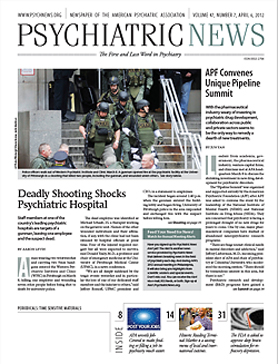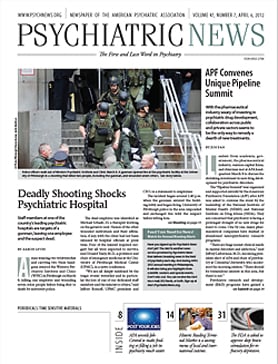FDA Advisory Committee Recommends Approval of Qnexa
A panel of advisers convened by the Food and Drug Administration (FDA) February 22 voted 20-2 to approve the weight-loss drug Qnexa, a controlled-release combination of phentermine and topiramate, being developed by Vivus. The FDA previously rejected Qnexa due to safety concerns, but scheduled a review by the Endocrinologic and Metabolic Drugs Advisory Committee. The committee recommended Vivus be required to conduct a large, follow-up study of the pill’s cardiovascular effects, but said that study could come after FDA approval because the impressive weight-loss results seen with Qnexa might outweigh those concerns.
The FDA is not bound by the recommendations of its advisory committees, but will consider the guidance during its April 17 review of the New Drug Application that was submitted for Qnexa in October 2011.
Drug Shows Promise in Treating Acute Schizophrenia Exacerbation
Forest Laboratories and Gedeon Richter announced on February 28 positive results in two phase 3 clinical trials of cariprazine for treatment of acute exacerbation of schizophrenia symptoms. For the primary endpoint in each study, Positive and Negative Syndrome Scale (PANSS) score, the data showed that cariprazine-treated patients experienced significant symptom improvement compared with placebo-treated patients. All doses showed statistically significant separation from placebo starting at week 2 and at each subsequent time point, with the higher dose showing separation as early as week 1 of treatment. Further analyses of the data in each study will be completed in the coming weeks. The results of these two studies were consistent with the results of the previously completed placebo-controlled phase 2b fixed-dose study in this population.
Cariprazine is an orally active, dopamine D3,D2 receptor partial agonist that is also being studied for patients with bipolar depression and as an adjunct treatment for major depressive disorder.
Vyvanse Capsules Approved for ADHD
On February 7, Shire announced that the FDA approved Vyvanse (lisdexamfetamine dimesylate) capsules as a maintenance treatment for adults with attention-deficit/hyper-activity disorder (ADHD). The approval is based on results from a randomized withdrawal study to evaluate the efficacy of Vyvanse in adults aged 18 to 55 who were receiving treatment with Vyvanse for a minimum of six months prior to enrolling in the study. Significantly more patients treated with Vyvanse maintained ADHD symptom control compared with placebo as determined by the proportion of patients who met criteria for relapse of symptoms at endpoint during the six-week randomized, double-blind withdrawal phase of the study (8.9 percent of Vyvanse-treated patients vs. 75 percent for placebo). This new approval adds to the indication for Vyvanse as a treatment for ADHD in patients aged 6 and above.
Merck Moves Forward With Suvorexant
Merck provided an update in February on the development program for suvorexant, an investigational orexin receptor antagonist, which, if approved, will be a new mechanism for treatment of insomnia. Two phase 3 efficacy trials for suvorexant have been completed, and based on the positive results of these studies, Merck plans to file a New Drug Application for suvorexant with the FDA later this year.
Both phase 3 studies were multicenter, randomized, double-blind, placebo-controlled clinical trials that evaluated suvorexant compared with placebo in patients aged 18 and older. The primary endpoints were change from baseline in subjective total sleep time and time to sleep onset, wake time after persistent sleep onset, and latency to onset of persistent sleep at one and three months.
Selincro Reduces Alcohol Consumption in Alcohol-Dependent Patients
Lundbeck presented data on March 5 to the European Congress of Psychiatry in Prague demonstrating that alcohol-dependent patients were able to reduce their total alcohol consumption by 66 percent, on average, after six months of treatment with the opioid-system modulator Selincro (nalmefene). The phase 3 data showed that the effect is maintained and even improved after one year of treatment.
The symposium presentation included results from the three placebo-controlled clinical phase 3 studies (ESENSE 1, ESENSE 2, and SENSE). Further details of the ESENSE 2 and SENSE studies will be presented at the Annual Research Society on Alcoholism Scientific Meeting in San Francisco in June. Selincro is thought to reduce the reinforcing effects of alcohol, helping the patient to reduce drinking.
All studies were multicenter, randomized, double-blind, placebo-controlled, parallel-group studies of 18 mg Selincro taken as needed in patients with alcohol dependence, according to DSMIV criteria. Patients were instructed to take one tablet on each day they perceived a risk of drinking alcohol, preferably one to two hours prior to the anticipated time of drinking. Medical advice and support to enhance motivation and adherence were included in all treatment arms in the studies. No abstinence treatment goal was imposed.
A total of 1,997 patients were randomized in the three studies, 604 patients in ESENSE 1 (298 on placebo, 306 on Selincro), 718 in ESENSE 2 (360 on placebo, 358 on Selincro), and 675 in SENSE (166 on placebo, 509 on Selincro).
In all studies a wide range of secondary endpoints were assessed, including the proportion of responders based on drinking measures, alcohol-dependence symptoms and clinical status, liver function, other laboratory tests, and pharmacoeconomic outcomes.
In all three clinical studies, the overall safety profile of Selincro was consistent with observations and data provided in previous studies, resulting in a total clinical database of more than 3,000 individuals. The most frequent adverse events included dizziness, insomnia, and nausea and were mild and transient. The majority of these events had an onset within the first days after the first dose and decreased with treatment continuation.
Lundbeck holds the global rights to the compound and submitted a European Marketing Authorisation Application for nalmefene in December 2011 for the treatment of alcohol dependence via the centralized procedure for regulatory approval in Europe.
DEA Controls Synthetic Cannabinoids for Six More Months
On February 29, the U.S. Drug Enforcement Administration (DEA) exercised its emergency scheduling authority to extend the control of five chemicals (JWH-018, JWH-073, JWH-200, CP-47,497, and cannabicyclohexanol) used to make so-called “fake pot” or “spice” products by six additional months while the permanent scheduling process is under way. These chemicals will continue to be designated as Schedule I substances.
“We continue to address the problems of synthetic drug manufacturing, trafficking, and abuse. Our efforts have clearly shown that these chemicals present an imminent threat to public safety,” said DEA Administrator Michele Leon-hart. “This six-month extension is critical and gives us the time necessary to conduct the administrative scheduling process for permanent control.”


